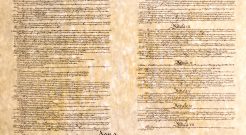The mistake that the Supreme Court makes is to presume that the answer to this specific question must be found in the Constitution.
"We decline to follow the constitutional course”
In what way does the federal courts’ “exclusive jurisdiction” under certain federal statutes—here, the Securities Exchange Act—differ from their general “federal question” (or “arising under”) jurisdiction under 28 USC 1331? That was a totally great FedCourts exam question until last Tuesday, when the Supreme Court heard arguments in Merrill Lynch v. Manning. Now I have to invent a new question. How dare they.
In the highly unlikely event you’re interested: right out of the box, counsel for Merrill Lynch described the Court’s federal question jurisprudence as a “Jackson Pollock canvas.” That’s one of the better openings I’ve seen, and it’s a polite understatement. The rule was tolerably clear until 1986, when Justice Stevens deliberately mucked it up, the better to turn Title 28 of the U.S. Code into a trial lawyers’ bill of rights. In short order that new rule became a four-factor test and then another, partially overlapping four-factor test—enough to satisfy even Justice Breyer’s taste for nuance; more than enough to prompt suicidal thoughts among law students and district judges (the reversal rate in these types of cases is around 65 percent). And yet throughout the argument, justices from every corner treated the 1331 “test” as gospel and by all means, let’s make exclusive jurisdiction work that way. This cannot end well.
Apropos which: today (Pearl Harbor Day, fittingly) the Court will hear arguments in Franchise Tax Board of California v. Hyatt, a case I’ve previewed here. Briefly, again: California citizen (good guy) escapes to Nevada; FTB of California hounds him for alleged tax evasion. Citizen sues FTB in Nevada court for a bunch of common law offenses. Why not in California? Because under California state law, the FTB and its officials enjoy immunity from suit. Why not in federal court, in diversity? Because “the judicial power of the United States shall not be construed to extend to any suit … against one of the United States by citizens of another state.” That’s the Eleventh Amendment: sovereign immunity.
Why doesn’t the FTB remove this case to federal court? Because it can’t, for a bunch of reasons. But doesn’t the Constitution (Article IV) command the Nevada courts to give full faith and credit to a sister-state’s public acts—here, California’s immunities? No, said the U.S. Supreme Court in the first go-around of this case: full faith and credit means zero faith and credit. “We decline to follow the constitutional course” (verbatim quote) and besides, what can possibly go wrong in state court?
Well, they could treat a sister-state like an out-of-state corporation. On remand in this case, a Nevada jury hammered the FTB for $450 million. The Nevada Supreme Court reversed most of that and remanded for yet another proceeding on emotional distress damages. In the pending (interlocutory) proceeding the FTB, represented by Paul Clement, says two things. First, Nevada should at least be obliged to observe the immunities and damage limitations that would apply to its own government agents. Second, and more dramatically, the Board (supported by forty-plus state amici) argues that states should enjoy sovereign immunity in sister-states’ courts. To that end the Court would have to, and should, overrule Nevada v. Hall (1979), another John Paul Stevens masterpiece.
There are many reasons for doing so. Among them: a central purpose of federal courts and jurisdiction is to provide a neutral forum for interstate disputes. In that forum, states enjoy Eleventh Amendment immunity (unquestionably, in diversity cases; much more oddly, when they’re being sued by their own citizens on a federal claim.) Still, we’re supposed to believe that states do not enjoy immunity when they’re getting home-cooked in a sister-state’s courts. That’s the rule. Whether it makes any sense is a different question.
If any branch of the law demands clear and simple rules, it’s jurisdiction. It’s 80 percent of the Constitution—and alas, an atrocious mess.


